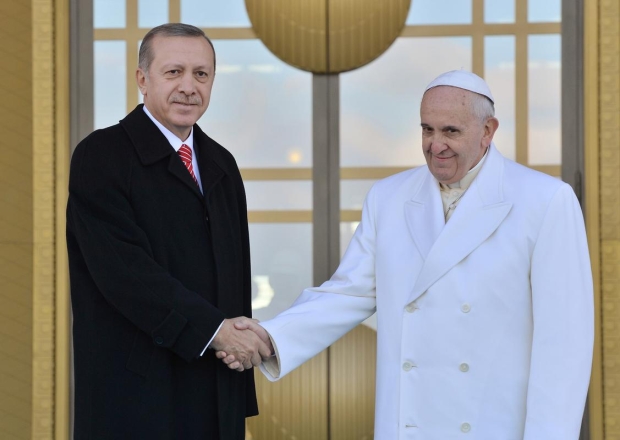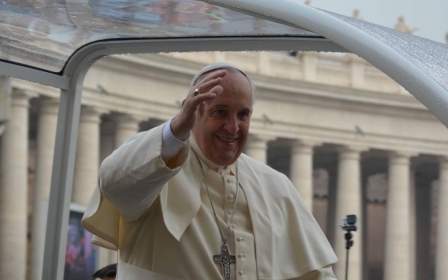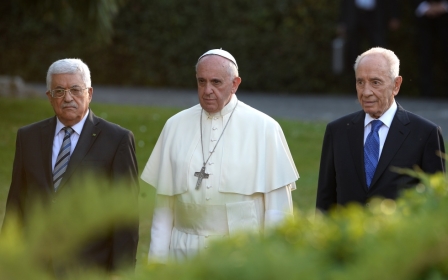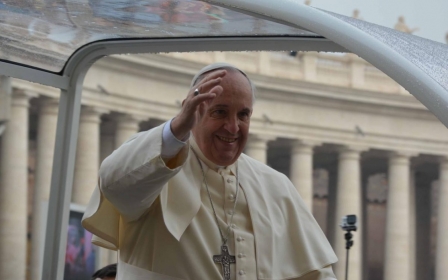Pope urges Muslim leaders to 'clearly' condemn terror
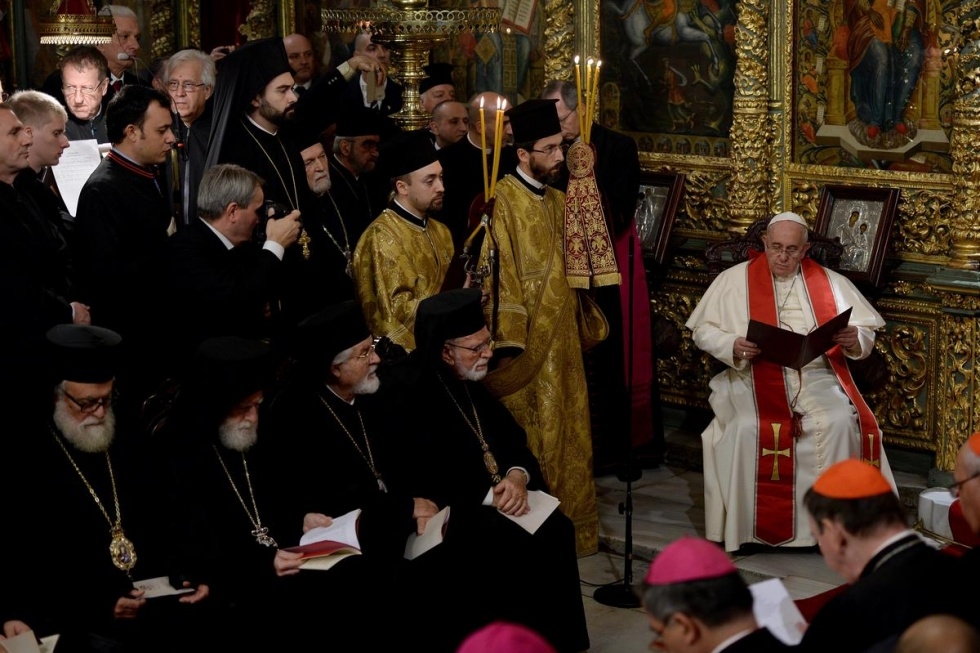
Pope Francis on Sunday urged Muslim leaders worldwide to "clearly" condemn terrorism carried out in the name of Islam.
Francis said he had told Turkish President Recep Tayyip Erdogan that "it would be wonderful if all the Muslim leaders of the world -- political, religious and academic, spoke up clearly and condemned" violence which damages Islam.
"That would help the majority of Muslims if that came from the mouths of these political, religious and academic leaders. We all have need of a global condemnation," Francis told reporters aboard the plane taking him back to Rome after a three-day visit to Turkey.
The pope acknowledged that current global crises had generated a danger of all Muslims being tarred with the same brush.
"I sincerely believe that you cannot say that all Muslims are terrorists just as you cannot say that all Christians are fundamentalists; every religion has these little groups," the pope was quoted as saying.
In a rare joint plea, the pope and Orthodox Ecumenical Patriarch Bartholomew I spoke out against anti-Christian violence, saying the world could not stand by and allow "a Middle East without Christians."
Turkey's Christian community is tiny -- just 80,000 in a country of some 75 million Muslims -- and only a small proportion of these are Catholics.
Francis's trip was less controversial than the last by a pontiff -- the visit by his predecessor Benedict XVI in 2006 was overshadowed by remarks he had previously made deemed to be anti-Islamic.
In a hugely symbolic moment, the pope during a visit Saturday to Istanbul's Ottoman Sultan Ahmet mosque -- better known abroad as the Blue Mosque -- turned towards Mecca and stood in two minutes of reflection next to a top Islamic cleric.
"I prayed for peace, for Turkey, for everyone, for myself. It was a moment of sincere prayer," the pontiff later said about the gesture.
Schism between Orthodox and Catholic Churches
On the final day of his first visit to Turkey, Francis urged an end to the millennium-old schism between the Orthodox and Catholic Churches.
Early Sunday he attended a divine liturgy led by Bartholomew, the "first among equals" of an estimated 300 million Orthodox believers.
"How can we credibly proclaim the message of peace which comes from Christ if there continues to be rivalry and disagreement between us?" he said in an address at the Orthodox Patriarchate.
Bartholomew for his part said that while the road to full communion would be "perhaps lengthy and sometimes even rugged" it was irreversible.
He echoed the pope's comments that the violence against Christians had made this more pressing. "We no longer have the luxury of isolated action."
The pope and Bartholomew have in the last months worked hard for a rapprochement between the eastern and western Churches which have been split since the schism of 1054.
The reconciliation began in 1964 with the famous embrace in Jerusalem between Pope Paul VI and Ecumenical Patriarch Athenagoras, the first such meeting since the 15th century.
Bartholomew, who commands considerable respect beyond the Orthodox Church, holds an office that dates back to the early days of the Byzantine Empire.
During a prayer service Saturday, the pope bowed his head and asked Bartholomew to kiss him on his brow, in a remarkable sign of humility towards the patriarch.
Support Turkey
The pope urged Sunday the international community to support Turkey on its response to Syrian and Iraqi refugees.
He praised Turkey's efforts to shelter refugees from conflict zones. Turkey hosts an estimated 1.6 million Syrian refugees.
"Turkey has showed great generosity and received many migrants," the pope noted.
"I wish to express my appreciation for everything that the Turkish people, Muslims and Christians, are doing to help thousands of peoples who are leaving their countries due to conflicts."
Addressing a joint press conference Friday, Erdogan said that "state terrorism in Gaza goes unnoticed."
The Turkish president said he and the pope had common views on almost every subject they discussed, including how to combat terrorism.
"The pope's visit is very important, given that our region and the world are going through a difficult time right now," he said.
He highlighted the fact that there were millions of desperate people who felt abandoned and exploited by terrorist groups such as the Islamic State (IS).
"I would like to stress that terrorist organizations like al-Qaeda, the ISIL and Boko Haram emerged because of the wrong policies that have been ongoing for many years," Erdogan said.
The president also said that the world seemed to have forgotten about the atrocities committed by Syrian President Bashar al-Assad.
"The ISIL is known globally right now, and it makes headlines every day. Some measures are now being taken against it, but there has been no real talk about the man who kills his own people in Syria," Erdogan said.
"The condition of nearly seven million people in Syria who are seeking shelter outside their country is being neglected. There is also state terrorism there," he said.
About Israeli offensives at Islam’s third holiest site, the al-Aqsa Mosque, the president said the world remains insensitive to the issue.
Middle East Eye propose une couverture et une analyse indépendantes et incomparables du Moyen-Orient, de l’Afrique du Nord et d’autres régions du monde. Pour en savoir plus sur la reprise de ce contenu et les frais qui s’appliquent, veuillez remplir ce formulaire [en anglais]. Pour en savoir plus sur MEE, cliquez ici [en anglais].



